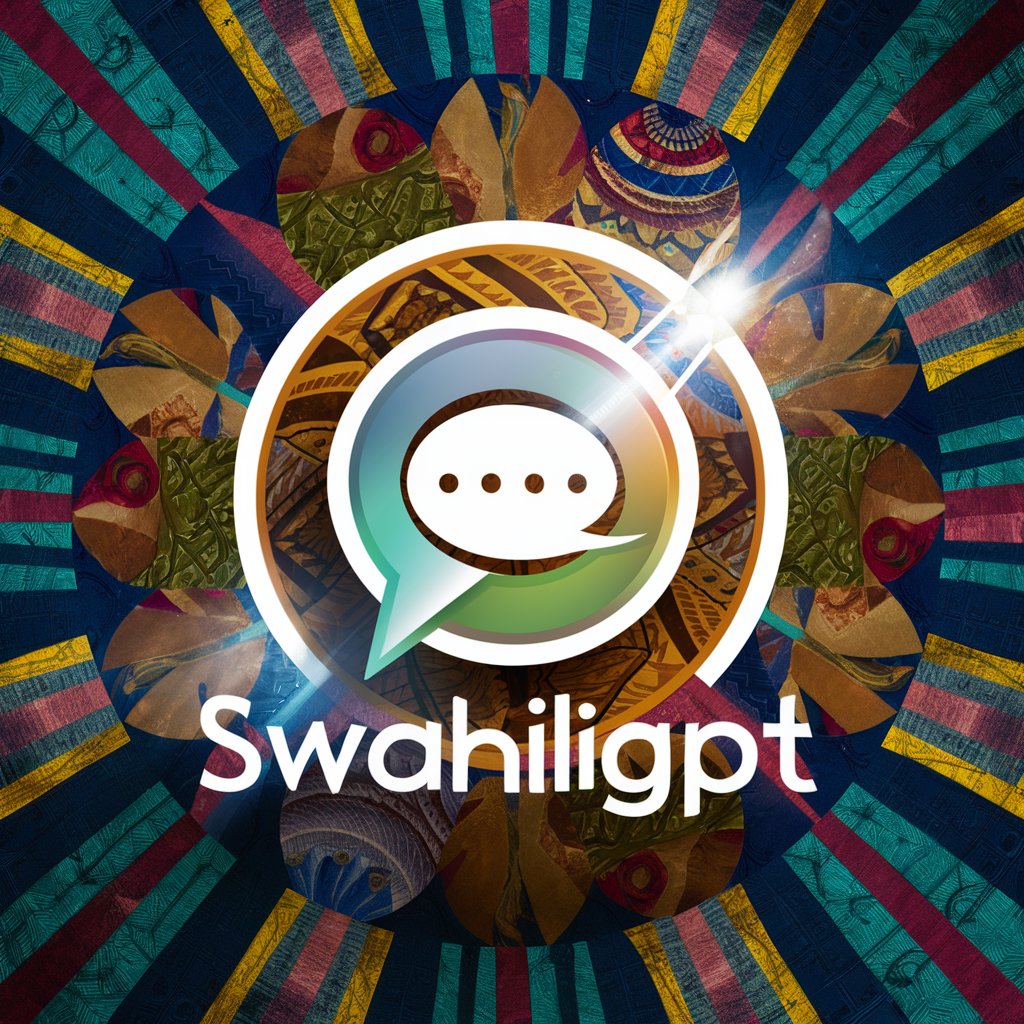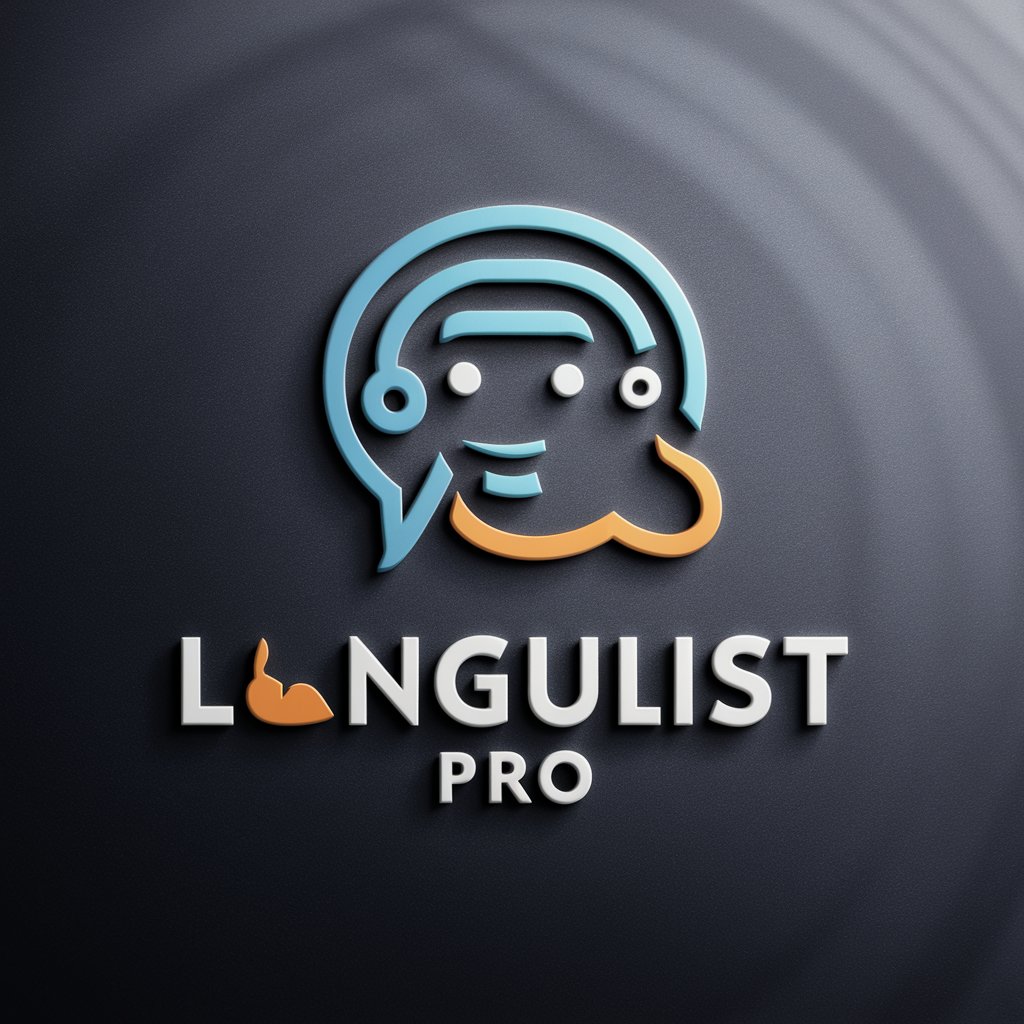Swahili - Swahili Learning and Cultural Insight

Karibu! Let's explore the Swahili language together.
Empowering language mastery with AI-driven insights.
Translate the following phrase into Swahili:
Can you explain the cultural significance of
What are some common phrases in Swahili for
Recommend some resources for learning Swahili, including
Get Embed Code
Introduction to Swahili
Swahili, also known as Kiswahili, is a Bantu language and the first language of the Swahili people. It's a lingua franca of the African Great Lakes region and other parts of East and Southern Africa, including Tanzania, Kenya, Uganda, Rwanda, Burundi, Mozambique, and the Democratic Republic of the Congo. Swahili is characterized by its rich history, influenced by contact with Arabic, Persian, Indian, and European cultures, leading to significant borrowings, especially from Arabic, due to centuries of trade and cultural exchange along the Swahili Coast. The language is written in the Latin alphabet and has a standardized grammar and vocabulary. Swahili plays a crucial role in regional communication, education, and as a medium of instruction in various academic and professional settings. It's also one of the official languages of the African Union. Examples of its cultural significance include its use in music, literature, and film, showcasing the diverse heritage and social practices of Swahili-speaking communities. Powered by ChatGPT-4o。

Main Functions of Swahili
Cultural Exchange
Example
Swahili is used in festivals and cultural events like the Zanzibar International Film Festival, facilitating cross-cultural dialogue and showcasing Swahili arts, music, and literature.
Scenario
Artists and attendees from different regions come together, using Swahili to share and experience diverse cultural expressions.
Education and Learning
Example
Swahili is a medium of instruction in schools across East Africa, used in textbooks and educational materials for teaching a variety of subjects.
Scenario
Students in Tanzania and Kenya learn in Swahili from an early age, enabling them to access education in a language that is culturally and linguistically relevant.
Language Preservation
Example
Swahili serves as a tool for preserving linguistic diversity, offering a platform for the documentation and promotion of local languages and dialects.
Scenario
Linguists and cultural practitioners collaborate on projects to record and promote endangered languages within the Swahili-speaking regions, using Swahili as a bridge language.
Communication and Commerce
Example
Swahili facilitates trade and communication across East Africa, being widely used in markets, business transactions, and international conferences.
Scenario
Traders and businessmen from different linguistic backgrounds use Swahili as a common language to negotiate deals and form partnerships.
Ideal Users of Swahili Services
Language Learners
Individuals interested in learning Swahili for travel, cultural exchange, or academic purposes. They benefit from services that offer language lessons, cultural immersion programs, and language practice platforms.
Academics and Researchers
Scholars focusing on African studies, linguistics, history, and cultural studies. Swahili services provide them with resources for research, language study, and fieldwork in Swahili-speaking regions.
Business Professionals
Entrepreneurs and business professionals engaging in trade or projects in East Africa. They utilize Swahili for effective communication, networking, and navigating the local market.
Tourists and Cultural Enthusiasts
Travelers and culture enthusiasts exploring the Swahili-speaking regions. Services in Swahili enhance their travel experience by facilitating deeper cultural immersion and interaction with locals.

How to Use Swahili with YesChat.ai
Initiate Your Journey
Begin by visiting YesChat.ai to access a free trial without any requirement for login or subscription to ChatGPT Plus, offering you a seamless start.
Select Swahili
Choose Swahili from the language options available to tailor your experience and interactions within the specific linguistic and cultural context.
Explore Use Cases
Engage with the tool for various applications such as learning basic phrases, understanding grammatical structures, or practicing conversation skills in Swahili.
Utilize Learning Resources
Take advantage of the embedded resources and tips for an optimal learning experience, including common phrases, cultural insights, and pronunciation guides.
Interactive Practice
Apply what you've learned in interactive sessions, enhancing your fluency and comprehension through real-time conversation simulations and quizzes.
Try other advanced and practical GPTs
0_master prompt
Elevate creativity with AI-powered precision

SEOX Blog Wizard
Elevate Your Blog with AI

Linguist Pro
Crafting Language with AI Precision

PERITOMÉDICO
Empowering medical-legal decisions with AI

Prompts Creativos AI
Igniting Creativity with AI-Powered Prompts

스타일 어드바이저
Discover Your Best Look with AI-Powered Style Advice

Estrategia CRM
Empowering Customer Connections with AI

Thumbnail Genius
AI-powered Thumbnail Design Simplified

Evans AI
Empowering crypto investments with AI-driven insights.

Professional Psychologist
AI-powered Emotional Support and Guidance

Home Decor
Elevate Your Space with AI-Powered Design Insights

CraftMaster
Empower your creativity with AI

Frequently Asked Questions about Swahili
What is Swahili?
Swahili, also known as Kiswahili, is a Bantu language and the first language of the Swahili people. It's a lingua franca of the African Great Lakes region and other parts of eastern and southeastern Africa, including Tanzania, Kenya, Uganda, Rwanda, Burundi, Mozambique, and the Democratic Republic of the Congo.
How difficult is it to learn Swahili for English speakers?
Swahili is considered one of the easier African languages for English speakers to learn due to its use of the Latin alphabet and relatively straightforward phonetic system. It also has fewer tones compared to many other African languages, making pronunciation easier for beginners.
Are there any unique features of Swahili culture that are reflected in the language?
Swahili culture is deeply interwoven with the language, reflecting its historical trade relationships, Islamic influences, and the blend of African, Arab, and Persian cultures. This is evident in its vocabulary, proverbs, and sayings, which often emphasize community, respect, and hospitality.
Can Swahili help in professional development?
Yes, Swahili can be a valuable asset in various professional fields such as international relations, education, tourism, and development work in East Africa. Proficiency in Swahili opens up opportunities for deeper engagement with communities and local projects in the region.
What are some tips for beginners learning Swahili?
Begin with basic vocabulary and phrases, focus on the pronunciation of vowels and consonants, practice regularly with native speakers or through language exchange programs, and immerse yourself in Swahili media like music, films, and books to enhance your understanding and appreciation of the language and culture.
